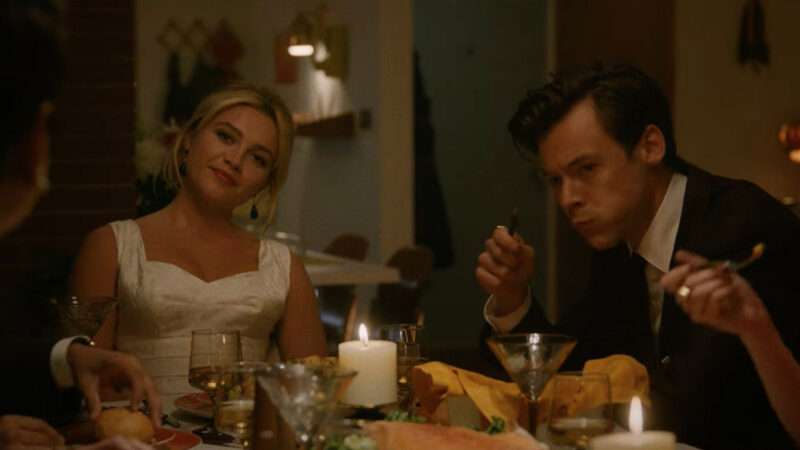
If you have heard anything about Don't Worry Darling, it's probably behind-the-scenes gossip about the movie's stars, Florence Pugh, Harry Styles, and Chris Pine, plus director Olivia Wilde, and their off-screen spats (and spits?).
It's rarely a great sign when the drama behind the camera overtakes the drama in front, especially with a would-be prestige picture like this one. Don't Worry Darling was positioned as the start to Hollywood's annual awards race, the late-year flood of cold weather Oscar hopefuls with Something Important To Say.
In theory, this was a movie with big ideas and big ambitions, with an up-and-coming female director working on a bigger canvas for the first time, and a screenplay drawn from the Black List, a collection of unproduced scripts highly praised by Tinseltown insiders.
Alas, Don't Worry Darling flubs its main ideas. This twisty period thriller is heavily influenced by The Truman Show and The Stepford Wives, but the inevitable Big Twist, which I won't spoil here, is both laboriously delivered and incredibly underdeveloped, leaving far too many unanswered questions. Yet I couldn't help but enjoy it anyway, not for its thematic ambitions, but as a pulpy contemporary update of The Twilight Zone—or, perhaps, Black Mirror with a much bigger budget. It's not a good movie, exactly, but it's often an entertaining one.
The story follows Alice Chambers (Pugh), a housewife living an idyllic life in a picture-perfect midcentury modern community somewhere in the desert. Alice is married to Jack (Styles, in a sort of glum Sinatra mode), who she treats every night with scotch and steak. They have it all—and so do the other similarly comfortable couples around them. They're living the American Dream, postwar style, with housewives and homeownership, beautiful lawns and immaculate glassware.
Inevitably, there are questions and complications. For one, the men all work together in a hidden underground facility on something called the Victory Project, and the only thing they can say about their jobs is that they're working on developing "progressive materials." There are ominous earthquakes that rumble the town. And the town, well, where exactly is it supposed to be? There are precious few references to the outside world, and those that exist seem to have been drawn from suspicious shared scripts. Except when the men go to work, no one is allowed to leave.
All of this is overseen by Frank (a swanky, villainous Chris Pine), the Victory Project's dashing leader, who is constantly delivering vaguely menacing inspirational monologues about how the men are involved in an important project that will change the world.
There's something cultlike about the whole project, something stultifying about its midcentury fantasy of male breadwinners and happy middle-class homes, and inevitably it all comes crashing down in a ludicrous twist that transforms the subtext into text while raising as many plot questions as it resolves.
Despite the plot problems, there's something enjoyable about watching it all play out, simply because it's so lavishly crafted and executed. Katie Byron's period production design is immaculate, and cinematographer Matthew Libatique imbues every image with a lush and golden glow that sells the midcentury fantasia. Pine makes the most of studiously vague dialogue, and Styles' turn as a sort of Rat Pack sad-sack works better than it should.
As director, meanwhile, Wilde isn't afraid to make bold stylistic choices, pumping up the soundtrack at times, setting up strange and memorable visuals, and intercutting Alice's dull domesticity with hallucinatory visions. Don't Worry Darling is rather clunky at the story level, but it's often effective at capturing mood, tone, and state of mind.
It's Pugh, however, who holds the movie together. Even with an underwritten role that tends to muddle her motivations, she's utterly magnetic, and one of the most promising performers working today. She comes close to turning this pulpy, preposterous movie into the scathing sci-fi think piece it so clearly yearns to be.
Ultimately, though, this isn't a Big Idea movie, it's a Dumb Idea movie. It yearns to say something important about the state of contemporary womanhood, the way that domesticity traps women, the male desire for female subservience, the pathetic character of modern men, and the rest of the Betty Friedan catalog of complaints. But its thematic ambitions end up tripping over its desire to package all of this into an accessible high-concept genre piece; rather ironically, Darling's ideas are undercut by its desire to please.
The post The Feminist Dystopia <em>Don't Worry Darling</em> Isn't a Big Idea Movie. It's a Dumb Idea Movie. appeared first on Reason.com.







